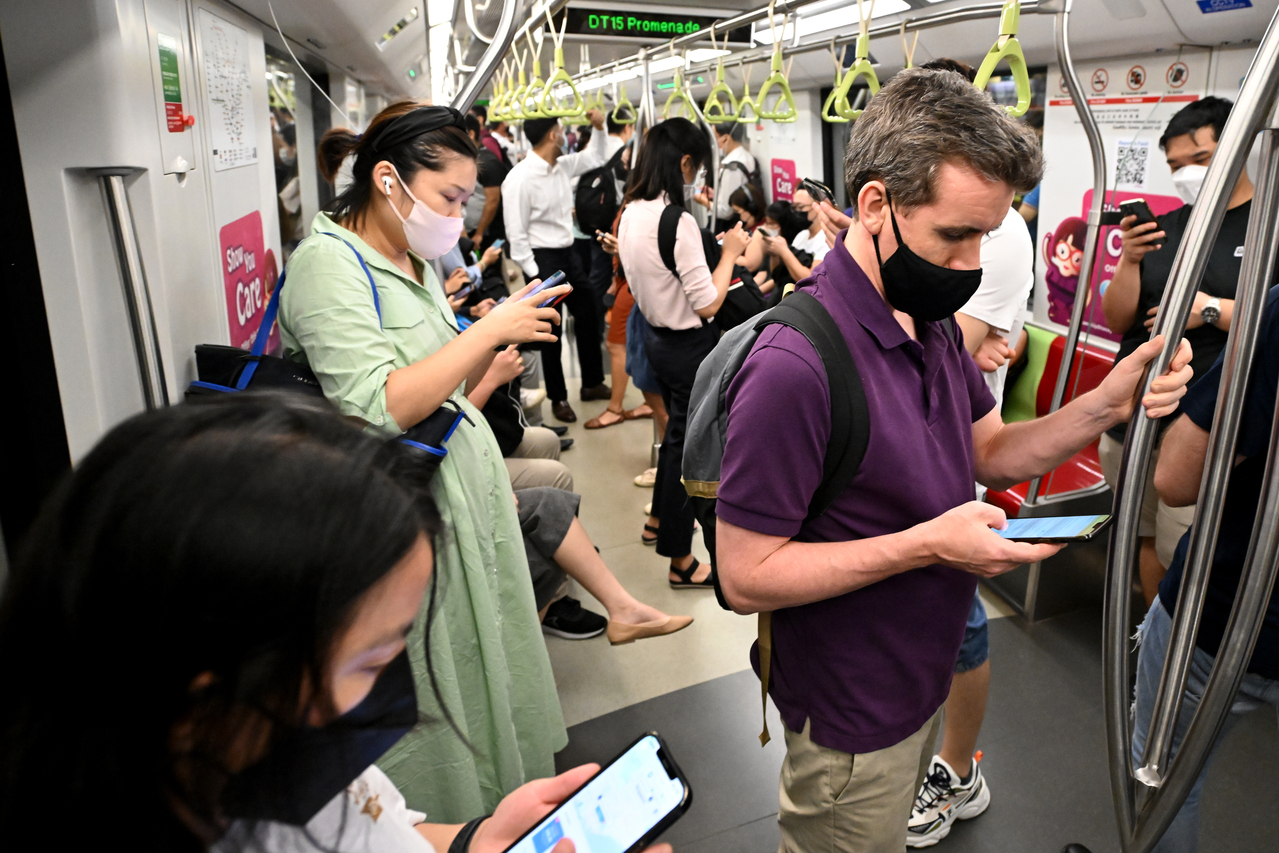Reliability of MRT network hit new high in first quarter of 2022; only 1 major breakdown
Sign up now: Get ST's newsletters delivered to your inbox

MRT and LRT lines are likely to be put under further stress in the coming months as more people move about and return to work.
ST PHOTO: LIM YAOHUI
SINGAPORE - The MRT network clocked a new high of 2.48 million train-km between delays in the first quarter of the year, up from 1.7 million train-km in the same period last year.
Figures from the Land Transport Authority (LTA) showed that there was just one breakdown that exceeded 30 minutes in the first quarter of 2022 across the MRT and LRT network - a train fault on the North-East Line (NEL) on Jan 23.
The MRT network had logged 1.32 million train-km for every delay that was longer than five minutes in pre-pandemic 2019, a statistic that steadily improved amid the low ridership during the next two pandemic years.
Back in 2015, the network's mean kilometre between failures - a measure of reliability used by train operators around the world - was only 133,000 train-km.
The report card, posted on LTA's website on Tuesday (May 31), comes as the number of commuters has gradually recovered with the dropping of Covid-19 restrictions, hitting 78 per cent of 2019 levels in the last week of April.
MRT and LRT lines are likely to be put under further stress in the coming months, with more people using public transport to move about and return to work.
Already, hours-long delays have occurred on the East-West Line (EWL) and the Bukit Panjang LRT (BPLRT) in the last few weeks, breakdowns that should be factored into the current quarter.
The LTA posts rail reliability figures every quarter, which are calculated using a 12-month moving average, meaning that the latest figure is for the period of April last year to March 2022.
It uses this metric to better discern long-term trends, as measuring rail reliability over a shorter timeframe leads to bigger variations with data sometimes skewed, for instance, by multiple breakdowns over a short span of time.
Among the five MRT lines, the Downtown Line (DTL) was the top performer, posting an average of 8.23 million train-km before each delay, much higher than the North-South Line (NSL), which came in second at 3.3 million train-km.
The Circle Line (CCL) was third at 2.44 million train-km, overtaking the North-East Line at fourth with 2.07 million train km. The East-West Line was fifth at 1.46 million train-km.
The DTL, NSL and CCL fared significantly better compared with the previous quarter, while the NEL and EWL posted similar results.
The LRT network also improved in reliability, averaging 441,000 train-km before each delay at the end of March this year, compared with 292,000 train-km last year.
The Sengkang-Punggol LRT's reliability more than doubled from 341,000 train-km last year to 799,000 train-km this time around, while the BPLRT slightly improved from 224,000 train-km before each delay to 226,000 train-km.
About $173 million of reliability incentives - the full amount available - went to train operators SMRT and SBS Transit last year as both companies achieved more than one million mean kilometres between failures for the MRT lines they ran.
Associate Professor Raymond Ong of the National University of Singapore said the results show that the railway maintenance regimes adopted over the past two to three years are working well. He singled out the NSL, which posted good results despite being one of the two oldest lines in Singapore, having opened in 1987.
He said regular preventive maintenance will continue to be the most important strategy in reducing the risk of breakdowns when even more people start commuting.
"More effort in planning future maintenance programmes is required to ensure that EWL and NEL can maintain or improve their performance. These two lines are older lines, with EWL similar in age to the NSL," he said, adding that NEL is nearly 20 years old.
He added: "The same goes for the Bukit Panjang LRT. Operators and agencies should not relax and have to continue to maintain our rail infrastructure."
The BPLRT has had two disruptions this quarter, including one caused by a stalled train that delayed service for three hours on May 24, forcing 48 commuters to alight and walk to the station along the LRT tracks.
The line is undergoing a $344 million renewal of its signalling system and trains that is on schedule to be completed by 2024.
SMRT also apologised on Tuesday (May 31) for the second EWL delay in three days.
Ms Eden Teoh, 25, who works in the legal industry, said the crowd on trains seems to have returned to pre-pandemic levels.
"There have been more breakdowns lately and more people are taking trains. I miss when my morning commute was less packed, but it's good to know that Singaporeans are out and about again," she said.


